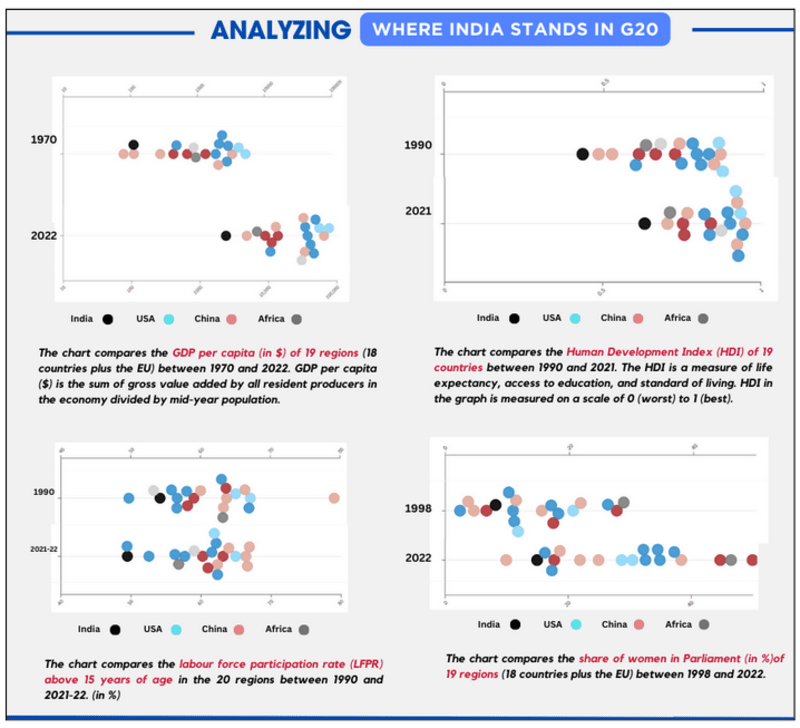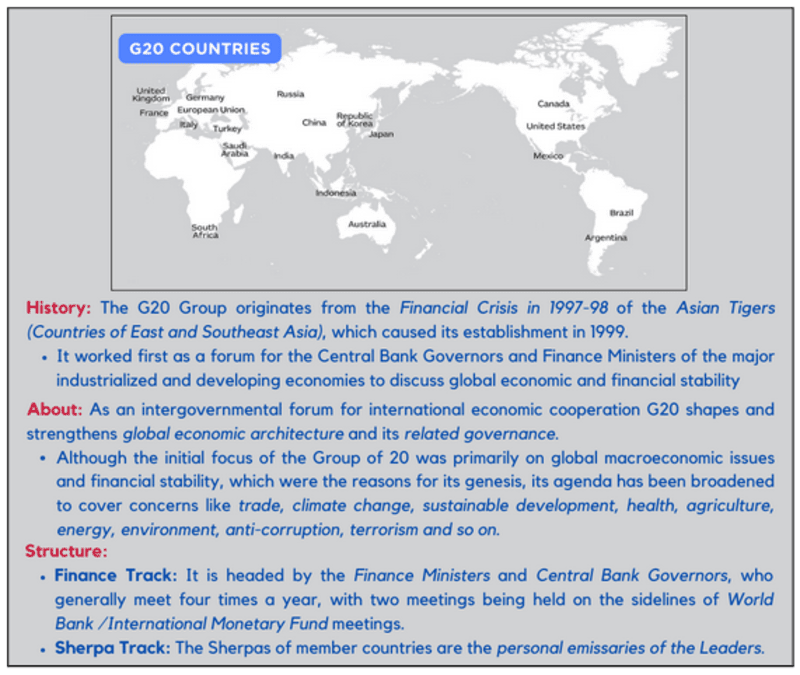365 days of India's G20 Presidency
“Diversity is a fact, but inclusion is a choice we make every day. As leaders, we have to put out the message that we embrace and not just tolerate diversity.” – Nellie Borrero
Relevance: GS II (International Relations)
- Prelims: International Organization and its initiatives; G20;
- Mains: Inclusive and Sustainable Development; G20;
Why in the News?
India completed its 365 days of G-20 Presidency. It is a moment to reflect, recommit, and rejuvenate the spirit of ‘Vasudhaiva Kutumbakam’.

About:
- On September 9 and 10, India hosted the 18th G20 Summit in New Delhi, focusing on the theme ‘One Earth, One Family, One Future.’
- India sought to offer the world an alternative to the status quo, a shift from a GDP-centric to human-centric progress. It aimed to remind the world of what unites us, rather than what divides us.
- Further, Food security, climate change, energy, development, healthcare, and digitalization were deliberated upon at the global forum, which was formed to discuss economic and financial matters. This required a fundamental reform of multilateralism.
- The summit was wrapped up successfully by transferring the G20 Presidency to Brazil.
Initiatives by India towards Inclusive Development during G-20:
- India assumed a four-fold approach of - Inclusive, Ambitious, Action-Oriented, and Decisive (IAAD) which was adopted unanimously by all G20 members.
- Inclusive: Through Jan Bhagidari (people’s participation) events, the G-20 reached 1.4 billion citizens, involving all States and Union Territories as partners.
- The inclusion of the African Union (AU) as a permanent member of the G-20 integrated 55 African nations into the forum and fostered a more comprehensive dialogue on global challenges and opportunities.
- Ambitious: The first-of-its-kind ‘Voice of the Global South Summit,’ was convened by India in its two editions, heralding a new dawn of multilateralism.
- The edition was focused on the Global South’s concerns in international discourse and has ushered in an era where developing countries take their rightful place in shaping the global narrative.
- Action-oriented: India delivered the G-20 2023 Action Plan to Accelerate Progress on the Sustainable Development Goals (SDGs), taking a cross-cutting, action-oriented approach to interconnected issues, including health, education, gender equality, and environmental sustainability.
- Decisive: India has witnessed the revolutionary impact of digital innovations like Aadhaar, UPI, and Digilocker decisively.
- Through the G-20, India successfully completed the Digital Public Infrastructure Repository (featuring over 50 DPIs from 16 countries) a significant stride in global technological collaboration.
Initiatives by India towards a Cleaner and Greener World during G20:
For our ‘one earth’, India introduced ambitious and inclusive aims to create urgent, lasting, and equitable change as follows:
- Green Development Pact: The Declaration’s ‘Green Development Pact’ addresses the challenges of choosing between combating hunger and protecting the planet.
- This Pact outlines a comprehensive road map where employment and ecosystems are complimentary, consumption is climate-conscious, and production is planet-friendly.
- Tripling of renewable energy capacity: The G-20 Declaration was coupled with the establishment of the Global Biofuels Alliance and a concerted push for Green Hydrogen.
- According to an assessment by the International Energy Agency earlier this year, this single measure could result in an avoidance of 7 billion tonnes of carbon dioxide emissions by 2030.
- Lifestyles for Sustainable Development (LiFE): The G-20 declaration underscores India’s commitment to climate justice and equity, urging substantial financial and technological support from the Global North.
- For the first time, there was recognition of the quantum jump needed, and G-20 countries acknowledged that developing countries require $5.9 trillion to fulfill their Nationally Determined Contributions (NDCs) by 2030.
- Towards equitable global order: India is taking a leading role in UN reforms, especially in the restructuring of principal organs like the UN Security Council, which will ensure a more equitable global order.
- On Gender equality:
- Formation of a dedicated Working Group on the Empowerment of Women.
- India’s Women’s Reservation Bill 2023, reserves one-third of India’s Parliament and State Legislative Assembly seats for women.
Initiatives by India towards Geopolitical Issues during G20:
- Terrorism today has evolved rapidly, along with the global order, specifically over the past decade.
- Firstly, India raised issues that include threats from “new and emerging technologies for terrorist purposes”, “linkages between terrorism and organized crime”, and “denying terrorist groups safe haven”.
- Secondly, India also raised issues of digital terrorism like “securing digital public infrastructure”, “challenges posed by the darknet and crypto-currencies” and “collective measures to counter money laundering and terrorism financing”.
Conclusion:
Thus, for our ‘One Earth’, India introduced a renewed spirit of collaboration across these key priorities, focusing on policy coherence, reliable trade, and ambitious climate action. It is a matter of pride that during the Indian Presidency, the G-20 (New Delhi Leaders Declaration) achieved 87 outcomes and 118 adopted documents, a marked rise from the past.
BEYOND EDITORIAL:

Mains PYQs
Q. Is inclusive growth possible in the market economy? State the significance of financial inclusion in achieving economic growth in India. (2022)
Q. It is argued that the strategy of inclusive growth is intended to meet the objective of inclusiveness and sustainability together. Comment on this statement. (2019)
Q. Despite the consistent experience of high growth, India still goes with the lowest indicators of human development. Examine the issues that make balanced and inclusive development elusive. (2019)
Prelims PYQs
Consider the following statements: (2016)
- The Sustainable Development Goals were first proposed in 1972 by a global think tank called the 'Club of Rome'.
- The Sustainable Development Goals have to be achieved by 2030.
Which of the statements given above is/are correct?
(a). 1 only
(b). 2 only
(c). Both 1 and 2
(d). Neither 1 nor 2


